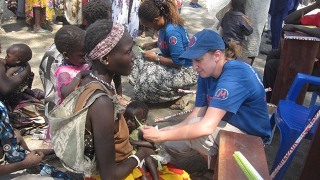UNICEF launches campaign to reduce child mortality in S. Sudan
By Julius N. Uma
July 31, 2012 (JUBA) – As South Sudan joins the rest of the world to commemorate world breast-feeding week, which begins 1 August, the United Nations Children Fund (UNICEF) on Tuesday urged communities in the new nation to recognise the value of breast-feeding in promotion better nutrition and survival.

In South Sudan, according to UNICEF, world breast-feeding week will be marked for the seventh time since it started in 2007.
“Breast milk alone for the first six months provides the child with the best start to life as it provides complete nutritional requirements”, said Pelucy Ntambirweki, UNICEF South Sudan Deputy Representative.
She appealed to all parents and communities to help mothers give their babies a concrete start to life by initiating breast feeding in the first hour of birth and continue to do so exclusively for six months.
Currently in South Sudan, UNICEF says, only 45 percent of babies are breastfed exclusively till the age of six months and attributes the low figure to a lack of awareness in the importance of early initiation and exclusive breastfeeding, inadequate support from families and communities, lack of counseling to new mothers on breast feeding and heavy work loads among mothers.
Also, 28 percent of under-five children in South Sudan are reportedly underweight, 23 percent are wasted and 28 percent are stunted. According to UNICEF, the 2011 post-harvest surveys results, revealed an average global acute malnutrition rate of 22 percent, which is far beyond the World Health Organization (WHO) acceptable threshold of 15 percent.
“The first milk, colostrum, is like the first immunization for a new-born since it contains antibodies, which strengthens the immune system of the new-born,” added Ntambirweki.
UNICEF recommends that after six months, complementary food should be introduced and it is important to continue breastfeeding the children at least up to the age of two years.
In the Global Strategy for Infant and Young Child Feeding, according to WHO, two-thirds of under-five deaths that occur in infancy are mostly related to poor feeding practices.
Meanwhile, UNICEF, in a statement extended to Sudan Tribune, said its supports South Sudan’s health ministry to manage malnutrition cases, through provision of therapeutic foods such as Ready to Use Therapeutic Foods (RUTF) as Plumpy nut, F-100 and F-75, which will reportedly help to treat severely malnourished children.
The theme for this year’s world breast-feeding day is, “Understanding the Past, Planning for the Future”.
(ST)
